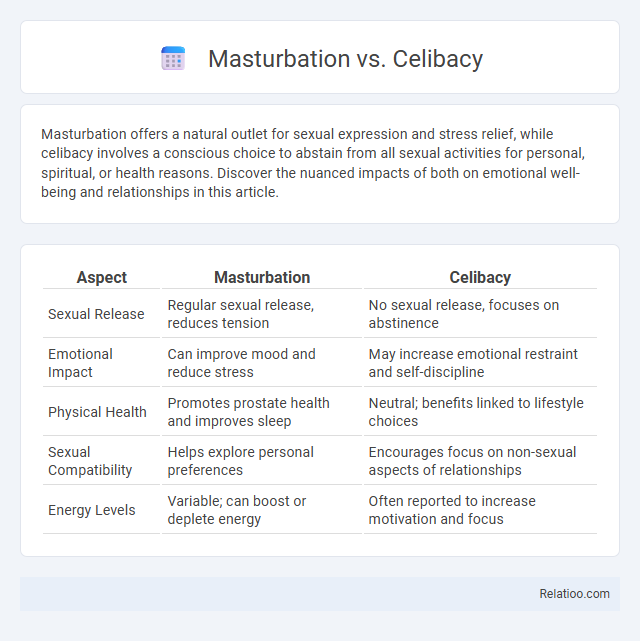Masturbation offers a natural outlet for sexual expression and stress relief, while celibacy involves a conscious choice to abstain from all sexual activities for personal, spiritual, or health reasons. Discover the nuanced impacts of both on emotional well-being and relationships in this article.
Table of Comparison
| Aspect | Masturbation | Celibacy |
|---|---|---|
| Sexual Release | Regular sexual release, reduces tension | No sexual release, focuses on abstinence |
| Emotional Impact | Can improve mood and reduce stress | May increase emotional restraint and self-discipline |
| Physical Health | Promotes prostate health and improves sleep | Neutral; benefits linked to lifestyle choices |
| Sexual Compatibility | Helps explore personal preferences | Encourages focus on non-sexual aspects of relationships |
| Energy Levels | Variable; can boost or deplete energy | Often reported to increase motivation and focus |
Understanding Masturbation: Definition and Common Myths
Masturbation involves self-stimulation of the genitals for sexual pleasure and is a natural, common behavior across all age groups. Contrary to widespread myths, masturbation does not cause physical harm, infertility, or mental health issues, and it often serves as a healthy way to explore your body and relieve stress. Understanding the distinctions between masturbation and celibacy, which is the deliberate abstention from sexual activity, can help you make informed decisions about your sexual health and well-being.
Exploring Celibacy: Meaning and Historical Context
Celibacy refers to the voluntary abstention from sexual activity, often practiced for religious, spiritual, or personal reasons, with roots tracing back to ancient traditions in Hinduism, Christianity, and Buddhism. Historically, celibacy was emphasized among priests, monks, and mystics as a path to spiritual purity and self-discipline, aiming to redirect sexual energy into creative or devotional pursuits. Understanding celibacy's cultural and psychological impacts can help you make informed decisions regarding your own sexual health and lifestyle choices.
Physiological Effects: Masturbation vs Celibacy
Masturbation stimulates the release of endorphins and dopamine, promoting stress relief, improved mood, and enhanced cardiovascular health. Celibacy, characterized by abstaining from sexual activity including masturbation, can lead to hormonal balance changes and may affect libido regulation over time. Your choice between masturbation and celibacy significantly influences physiological responses such as hormone levels, mental well-being, and overall reproductive system function.
Psychological Impact: Mental Health Considerations
Masturbation is associated with reduced stress and improved mood due to the release of endorphins and oxytocin, which promote relaxation and psychological well-being. Celibacy, while offering potential benefits like increased focus and discipline, may lead to heightened anxiety or loneliness if underlying emotional needs remain unaddressed. Balancing these practices requires attention to individual mental health, as excessive masturbation could correlate with guilt or shame, whereas celibacy without social support might exacerbate feelings of isolation.
Sexual Health Benefits and Risks
Masturbation promotes sexual health by improving mood, reducing stress, and enhancing sleep through the release of endorphins and dopamine. Celibacy may support emotional clarity and spiritual well-being but can lead to sexual frustration or anxiety if not managed carefully. Both practices have risks: excessive masturbation might cause physical irritation or guilt, while celibacy without sexual outlet can increase tension or negatively impact mental health.
Influence on Relationships and Intimacy
Masturbation can positively influence relationships and intimacy by allowing individuals to explore their bodies and understand their sexual preferences, which can enhance communication and satisfaction with partners. Celibacy, involving abstaining from sexual activities including masturbation, may foster emotional intimacy through non-physical connections but can also lead to challenges if physical desires remain unaddressed. Balancing masturbation and celibacy depends on personal values and relationship goals, as open discussions about sexual needs and boundaries are crucial for maintaining healthy intimacy.
Cultural and Religious Perspectives
Cultural and religious perspectives on masturbation versus celibacy vary significantly, with many faiths viewing celibacy as a path to spiritual purity while considering masturbation sinful or morally questionable. In some cultures, celibacy is honored as a disciplined lifestyle promoting self-control and devotion, whereas masturbation is often stigmatized due to beliefs about bodily sanctity and sexual restraint. Understanding these nuanced viewpoints can help you navigate personal choices within the context of your cultural and religious background.
Myths and Misconceptions Debunked
Masturbation, celibacy, and their interplay often spark myths that misunderstand their effects on mental and physical health. Contrary to common misconceptions, masturbation does not cause infertility, addiction, or mental health issues; instead, it can be a healthy expression of sexuality. Your knowledge about these practices empowers you to make informed decisions free from societal stigma and misinformation.
Choosing What’s Right for You
Choosing between masturbation, celibacy, or combining both depends on your personal values, mental health, and physical well-being. Understanding the benefits of masturbation, such as stress relief and sexual self-awareness, contrasts with celibacy's focus on discipline and emotional clarity. Your decision should reflect your lifestyle goals, emotional needs, and comfort with intimacy to ensure a balanced and fulfilling approach.
Conclusion: Balancing Personal Choices and Wellbeing
Balancing masturbation, celibacy, and personal wellbeing requires understanding individual needs and mental health impacts. Masturbation can promote stress relief and self-awareness, while celibacy may support spiritual or personal growth goals. Prioritizing self-care and emotional balance ensures choices align with overall health and lifestyle satisfaction.

Infographic: Masturbation vs Celibacy
 relatioo.com
relatioo.com